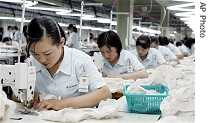2007年VOA标准英语-North Korean Workers Get a Raise - From South K(在线收听)
Seoul
06 August 2007
South Korean authorities have agreed to raise wages at a North-South joint venture in North Korea for the first time since the experimental zone was opened three years ago. The Kaesong venture is hailed in South Korea as a step toward North-South reconciliation. But as VOA's Kurt Achin reports from Seoul, concerns remain about ambiguities in the zone's operations.
 |
| North Korean female workers at factory of South Korean apparel maker Shinwon company in inter-Korean industrial park in Kaesong (file photo) |
The five percent increase is a compromise with the North, which announced several weeks ago that the Kaesong workers would "go on strike" if their pay was not boosted by 15 percent.
That threat may sound ironic to human-rights advocates, who say North Korean workers have no right to strike. Kay Seok is a South Korean representative of Human Rights Watch, a U.S.-based activist organization.
"When it comes to the most basic worker's rights issues, for example, the right to select their own representatives, the right to engage in collective bargaining - none of it is guaranteed there."
Seok's organization has conducted extensive studies of the Kaesong zone, which South Korean authorities call as much a political experiment as a business venture. It was funded and built by the South Korean government and Hyundae Asan, a private company, in 2004.
The project followed a first-of-its-kind North-South summit that set the tone for a new era of cooperation between the Cold War rivals.
The zone combines South Korean managers and capital with cheap North Korean labor to produce basic goods like apparel and kitchenware. Supporters say South Korean companies get to slash their costs, while communist North Korea gets a real world lesson in capitalism - all the while deepening the roots of North-South reconciliation.
Like much that happens in secretive North Korea, the Kaesong payroll process is far from transparent.
Wages do not go directly to the workers, but to the North Korean government. Pyongyang says it deducts about 10 percent for what it describes as a social welfare fund, and pays most of the rest in the form of food and other goods.
How much actual cash the workers end up receiving is unclear. What is certain is the form in which they receive it: North Korean won, at Pyongyang's official exchange rate of 151 to the dollar.
Seok says that is a lot less than they could get if they received the original U.S. dollars.
"North Korean currency is one of those that have a huge discrepancy between the official exchange rate and the black market rate. Imagine the North Koreans got paid in actual U.S. dollars. They would be making many, many times more than they do."
The United States and the European Union have rejected South Korean proposals for including Kaesong-produced goods in free-trade deals. They say too little is known about the workers' real conditions.
South Korean officials have organized a series of visits to the Kaesong zone for journalists and other international visitors. But access to workers themselves is tightly controlled, and workers are forbidden from discussing their salaries.
South Korean authorities say they expect Kaesong's procedures to become more transparent in the future, but North Korea has rejected calls from the United States and elsewhere for international supervision of the zone.